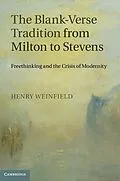Blank verse, unrhymed iambic pentameter, has been central to English poetry since the Renaissance. It is the basic vehicle of Shakespeare's plays and the form in which Milton chose to write Paradise Lost. Milton associated it with freedom, and the Romantics, connecting it in turn with freethinking, used it to explore change and confront modernity, sometimes in unexpectedly radical ways. Henry Weinfield's detailed readings of the masterpieces of English blank verse focus on Milton, Wordsworth, Shelley, Keats, Tennyson and Stevens. He traces the philosophical and psychological struggles underlying these poets' choice of form and genre, and the extent to which their work is marked, consciously or not, by the influence of other poets. Unusually attuned to echoes between poems, this study sheds new light on how important poetic texts, most of which are central to the literary canon, unfold as works of art.
Zusammenfassung
A detailed study of Milton, Wordsworth, Shelley, Keats, Tennyson and Stevens, tracing what lies behind their choice of blank verse.
